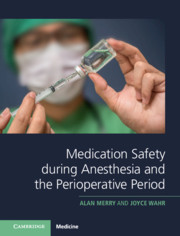Book contents
- Medication Safety during Anesthesia and the Perioperative Period
- Medication Safety during Anesthesia and the Perioperative Period
- Copyright page
- Dedication
- The Snow Vaporizer, Mark II
- Contents
- Foreword
- Acknowledgments
- 1 Introduction to Medication Safety in Anesthesia and the Perioperative Period
- 2 Failures in Medication Safety during Anesthesia and the Perioperative Period
- 3 Failures in Medication Safety in the Intensive Care Unit and Ward
- 4 Impact of Medication Errors on the Patient and Family
- 5 Consequences for the Practitioner
- 6 Why Failures Occur in the Safe Management of Medications
- 7 Errors in the Context of the Perioperative Administration of Medications
- 8 Violations and Medication Safety
- 9 Interventions to Improve Medication Safety
- 10 Medication Safety in Special Contexts
- 11 Legal and Regulatory Responses to Avoidable Adverse Medication Events, Part I: General Principles
- 12 Legal and Regulatory Responses to Avoidable Adverse Medication Events, Part II: Practical Examples
- 13 Barriers to Improving Medication Safety
- 14 Conclusions
- Index
- References
7 - Errors in the Context of the Perioperative Administration of Medications
Published online by Cambridge University Press: 09 April 2021
- Medication Safety during Anesthesia and the Perioperative Period
- Medication Safety during Anesthesia and the Perioperative Period
- Copyright page
- Dedication
- The Snow Vaporizer, Mark II
- Contents
- Foreword
- Acknowledgments
- 1 Introduction to Medication Safety in Anesthesia and the Perioperative Period
- 2 Failures in Medication Safety during Anesthesia and the Perioperative Period
- 3 Failures in Medication Safety in the Intensive Care Unit and Ward
- 4 Impact of Medication Errors on the Patient and Family
- 5 Consequences for the Practitioner
- 6 Why Failures Occur in the Safe Management of Medications
- 7 Errors in the Context of the Perioperative Administration of Medications
- 8 Violations and Medication Safety
- 9 Interventions to Improve Medication Safety
- 10 Medication Safety in Special Contexts
- 11 Legal and Regulatory Responses to Avoidable Adverse Medication Events, Part I: General Principles
- 12 Legal and Regulatory Responses to Avoidable Adverse Medication Events, Part II: Practical Examples
- 13 Barriers to Improving Medication Safety
- 14 Conclusions
- Index
- References
Summary
Medication errors are not random events, nor are they necessarily evidence of a lack of carefulness on the part of the practitioner concerned. To a substantial degree, the particular type of medication error that is likely to occur in a particular set of circumstances is predictable. Furthermore, each of these types of error will continue to occur at their current rate if we continue with current approaches to the management of medications in the perioperative period. Errors will not be reduced by ongoing calls for greater carefulness on behalf of individual practitioners. Instead, the need is for fundamental changes in the ways in which medications are presented, selected and administered to patients. Greater investment in systems-based initiatives to improve medication management is essential if medication safety is to improve. However, it is also essential for clinicians to engage with such initiatives if they are to be effective. Achieving this requires sustained effort by departments and institutions, informed by the principles of implementation science.
Keywords
- Type
- Chapter
- Information
- Medication Safety during Anesthesia and the Perioperative Period , pp. 106 - 129Publisher: Cambridge University PressPrint publication year: 2021

